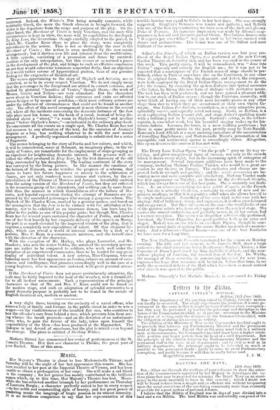Her Majesty's Theatre is about to lose Mademoiselle Titiens next
Saturday will-be the night of her last appearance this season. She has been recalled to her post at the Imperial Theatre ofVienna, and has been unable to obtain a prolongation of her conge. She will make a sad blank in the company ; for her genius has mainly contributed to the brilliant season which, up to this time Her Majesty's Theatre has had. Mean- while she has achieved another triumph by her performance on Thursday
Lucrezia Borgia; a character perfectly suited to her in every respect —to her noble and commanding style of beauty, and her great power of l'audering music the language of tragic passion in its utmost intensity. It is no invidious comparison to say that her representation of this
terrible heroine was equal to Grisns in her best days. She was strongly supported. Giuglini's Gemairo was tender and pathetic ; and Bclletti was one of the best representatives we have seen of the dark and gloomy Duke of Ferrara. An immense impression was made by Alboni's reap- pearance in her old and favourite part of Orsini. Her famous Anacreontic " Il segreto per csser feliee" was (as it used to be) twice encored with shouts and acclamations. The house was one of the fullest and most brilliant of the season.
Auber's Diarolo, of which an Italian version was last year pro- duced at the Royal Italian Opera, was performed at the new Covent Garden Theatre on Saturday last, and has been repeated in the course of this week. This pretty opera, it will be remembered, was "done into Italian" expressly and entirely for English use ; for it was not to be expected that a masterpiece of the French musical stage should be per- formed, either in Paris or anywhere else on the Continent, in any other than its original form. Scribe, the dramatist, and Auber, the composer, were both employed by the Royal Italian Opera management to do the job ; the former' by recasting the spoken dialogue into lyrical measures —the latter, by fitting this new form of dialogue with recitative music. The task has been well performed, and we have gained a pleasant addi- tion to our stock of Italian operas ; though the Parisians, assuredly, will never think of having one of their most favourite pieces in any other shape than that to which they are accustomed at their own Opera Co- mique. Our Italian Fra Diacolo, nevertheless, is a very attractive piece, splendidly nionh,e, and capitally acted and sung. Bosio, as Zerlina, is a most captivating Italian peasant girl, and sings Auber's sparkling music with a brilliancy not to be surpassed. Gardoni'e acting, in the robber- captain, is somewhat weak, but his beautiful singing makes up for his- trionic defects. Lorenzo, the lover, is a mere walking gentleman; • but there is some pretty music in the part, prettily sung by Neri-Baraldi. Ronconi's Lord Allcash is a most amusing caricature of the eccentricities of travelling Englishmen ; and Mademoiselle Marans personation of his susceptible and sentimental spouse is exceedingly clever. Altogether, this opera deserves the success it has met with.
The Drury Lane Italian Opera "for the people" goes on its way re- joicing, and gives unequivocal signs of success, not only in the crowds which it draws every night, but in the increasing spirit of enterprise of its management. Several important additions have been made to the company, including Madame Pauline Viardot, who would be a groat se- cession to any theatre in Europe. The orchestra and chorus are im- proved both in strength and quality ; and the scenic accessories are be- coming more and more complete and satisfactoiy. Madame Viardot made her first appearance on Tuesday, as Rosina in the Barbiereali Siviglia, which has always been one of her best parts. She is certainly not fault- less. As an actress everything she-does petillc d'esprit, as the French say ; but she is actually too clever, constantly in search of new and in- genious readings, so that it is a positive relief when she allows herself to. be simple and natural. Something of the same kind is the case with her singing : full of brilliancy, fancy, and expression, it is often over-laboured and exaggerated. But these are spots on the sun—the small faults of one of the greatest artists who have ever appeared on the musical stage. She excites the utmost enthusiasm, and probably never, in all her career, had a warmer reception. The opera was altogether satisfactorily performed. Lucchesi, the Count Alinaviva, has good qualities bath as an actor and singer. Badiali was on the whole an excellent Figaro, though he com- mitted the usual fault of making the astute Barber too much of a mounte- bank. And a debutant—Signor Insom—was one of the best Bartholos we have seen for a long time.
The New Philharmonic Concerts terminated for the season on Monday evening. The fifth and last concert, in St. James's Hall, drew a large audience ; the chief attractions being Beethoven's Sinfonia Eroica ; a fine Concerto of Dussek performed by Miss Arahelhs Goddard; and the mar- vellous playing of Joachim, the musical lion of the day. Dr. Wylde, the manager of these concerts, in announcing his series for next year, expresses his hope that measures will be taken, before that time, to re- medy the acoustical defects of the Hall which have been so much noticed ever since it was opened to the public.
Madame .Szarvady's last Matinee Musicale is announced for Friday next.


























 Previous page
Previous page